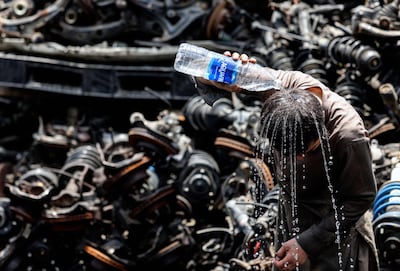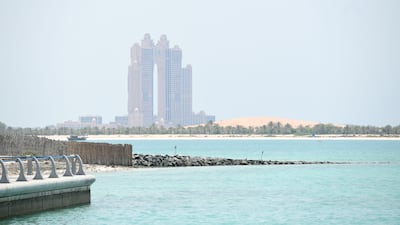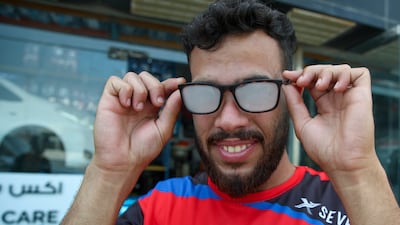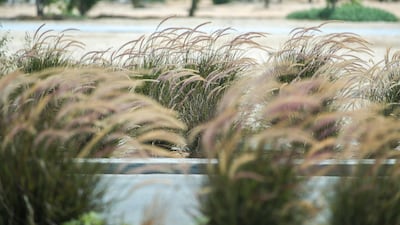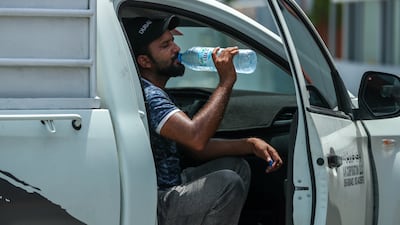As peak summer temperatures nudge ever closer to 50°C, doctors in the UAE are urging people to take special measures to stay healthy during the hot spell.
Those working outdoors and children are most vulnerable to the health risks associated with extreme heat, and those with existing respiratory conditions should take extra care, doctors said.
Signs%20of%20%20%20%20%20%20%20heat%20stroke
%3Cul%3E%0A%3Cli%3EThe%20loss%20of%20sodium%20chloride%20in%20our%20sweat%20can%20lead%20to%20confusion%20and%20an%20altered%20mental%20status%20and%20slurred%20speech%3C%2Fli%3E%0A%3Cli%3EBody%20temperature%20above%2039%C2%B0C%3C%2Fli%3E%0A%3Cli%3EHot%2C%20dry%20and%20red%20or%20damp%20skin%20can%20indicate%20heatstroke%3C%2Fli%3E%0A%3Cli%3EA%20faster%20pulse%20than%20usual%3C%2Fli%3E%0A%3Cli%3EDizziness%2C%20nausea%20and%20headaches%20are%20also%20signs%20of%20overheating%3C%2Fli%3E%0A%3Cli%3EIn%20extreme%20cases%2C%20victims%20can%20lose%20consciousness%20and%20require%20immediate%20medical%20attention%3C%2Fli%3E%0A%3C%2Ful%3E%0A
Heat stroke and the effects of dehydration are more likely as a result of time spent outdoors, but as the humidity reaches 100 per cent this week, serious lung conditions are also possible.
“The temperatures this year are a little more than expected and we need to look at how the heat affects the body and our lungs in particular,” said Dr Sandeep Pargi, a pulmonologist at Prime Hospital in Al Garhoud, Dubai.
Thankfully we don’t see many heatstroke cases, but everyone should recognise the signs so it can be treated fast
Dr Ram Shukla,
NMC Royal Hospital, Sharjah
“The common problem during summer is humid air, as it is heavy and the oxygen content is slightly less making it difficult for those with chronic lung conditions.
“People can be breathless – this is a result of water vapour in the air.
“We are seeing cases of pleural effusion during summer, where there is a build-up of fluid between the layers of tissue that line the lungs and chest cavity.
“There is a strong correlation with this condition and hot weather.
“Generally this is more common in people with asthma, or anyone with allergies that react to certain things like sand or dust.
“We can keep a tab on the weather and avoid going out if it is particularly humid, especially from 11am until 3pm, usually the hottest time of day.”
Changing climate
Avoiding the heat is commonplace for many, but some whose jobs require them to work outside for hours at a time have little choice but to brave the searing summer temperatures.
The UAE launched its annual mandatory midday break for outdoor workers on June 15, restricting labour outside from 12.30pm until 3pm.
The Ministry of Human Resources and Emiratisation policy is in place until September 15.
The risk of heat stroke could become a more familiar problem in years to come if average global temperatures continue to rise.
On Monday, July 3, the world’s average temperature reached a new high of 17°C for the first time.
While that reading is still well below the summer temperatures common in the Middle East, it points to a changing climate and the risk of more associated health problems in future.
While doctors said hospital admissions for heat stroke during summer were rare, people should be aware of the signs and symptoms and know how to respond, particularly if someone has an existing health condition.
“Thankfully we don’t see many heatstroke cases, but everyone should recognise the signs so it can be treated fast,” said Dr Ram Shukla, infectious disease specialist at NMC Royal Hospital, Sharjah.
“It has been a dry heat recently but now it is beginning to get very humid, which is worse for our health as we tend to sweat more and then lose salts and electrolytes very quickly.
“Children and anyone with a chronic health condition should take particular care.
"Diabetics, for example, are taking medicine that expels sugar in their urine, that increases the osmolality of urine making it thicker, almost like syrup.
“It dries out the body by removing water, so it should be a consideration.
“Hot dry skin, with a high body temperature and confusion with a slurred speech from a dry mouth are common signs and it can cause seizures or even be fatal."
How to protect and treat heat exhaustion
Do not drink excessive amounts of water to avoid water intoxication. Doctors say intake should be gradual.
People should cover up well and avoid the midday heat.
Wearing a cap is often seen as a good idea, but it can make the head sweat more, leading to more dehydration.
Wear loose-fitting headwear that is wet if possible when outdoors.
Anyone with suspected heat stroke should be taken out of the hot environment immediately and then be allowed to cool slowly.
Place cold towels under their arms to bring their temperature down.
LA LIGA FIXTURES
Thursday (All UAE kick-off times)
Sevilla v Real Betis (midnight)
Friday
Granada v Real Betis (9.30pm)
Valencia v Levante (midnight)
Saturday
Espanyol v Alaves (4pm)
Celta Vigo v Villarreal (7pm)
Leganes v Real Valladolid (9.30pm)
Mallorca v Barcelona (midnight)
Sunday
Atletic Bilbao v Atletico Madrid (4pm)
Real Madrid v Eibar (9.30pm)
Real Sociedad v Osasuna (midnight)
Race card
5pm: Maiden (PA) Dh80,000 1,600m
5.30pm: Maiden (PA) Dh80,000 1,600m
6pm: Arabian Triple Crown Round-2 Group 3 (PA) Dh300,000 2,200m
6.30pm: Liwa Oaisi Group 2 (PA) Dh300,000 1,400m
7pm: Wathba Stallions Cup Handicap (PA) Dh70,000 1,600m
7.30pm: Handicap (TB) Dh100,000 1,600m
The National selections: 5pm: Flit Al Maury, 5.30pm: Sadah, 6pm: RB Seqondtonone, 6.30pm: RB Money To Burn, 7pm: SS Jalmood, 7.30pm: Dalaalaat
GAC GS8 Specs
Engine: 2.0-litre 4cyl turbo
Power: 248hp at 5,200rpm
Torque: 400Nm at 1,750-4,000rpm
Transmission: 8-speed auto
Fuel consumption: 9.1L/100km
On sale: Now
Price: From Dh149,900
Alan%20Wake%20Remastered%20
%3Cp%3E%3Cstrong%3EDeveloper%3A%20%3C%2Fstrong%3ERemedy%20Entertainment%3Cbr%3E%3Cstrong%3EPublisher%3A%3C%2Fstrong%3E%20Microsoft%20Game%20Studios%3Cbr%3E%3Cstrong%3EConsoles%3A%3C%2Fstrong%3E%20PlayStation%204%20%26amp%3B%205%2C%20Xbox%3A%20360%20%26amp%3B%20One%20%26amp%3B%20Series%20X%2FS%20and%20Nintendo%20Switch%3Cbr%3E%3Cstrong%3ERating%3A%3C%2Fstrong%3E%204%2F5%3C%2Fp%3E%0A
How%20to%20avoid%20getting%20scammed
%3Cul%3E%0A%3Cli%3ENever%20click%20on%20links%20provided%20via%20app%20or%20SMS%2C%20even%20if%20they%20seem%20to%20come%20from%20authorised%20senders%20at%20first%20glance%3C%2Fli%3E%0A%3Cli%3EAlways%20double-check%20the%20authenticity%20of%20websites%3C%2Fli%3E%0A%3Cli%3EEnable%20Two-Factor%20Authentication%20(2FA)%20for%20all%20your%20working%20and%20personal%20services%3C%2Fli%3E%0A%3Cli%3EOnly%20use%20official%20links%20published%20by%20the%20respective%20entity%3C%2Fli%3E%0A%3Cli%3EDouble-check%20the%20web%20addresses%20to%20reduce%20exposure%20to%20fake%20sites%20created%20with%20domain%20names%20containing%20spelling%20errors%3C%2Fli%3E%0A%3C%2Ful%3E%0A
The bio
His favourite book - 1984 by George Orwell
His favourite quote - 'If you think education is expensive, try ignorance' by Derek Bok, Former President of Harvard
Favourite place to travel to - Peloponnese, Southern Greece
Favourite movie - The Last Emperor
Favourite personality from history - Alexander the Great
Role Model - My father, Yiannis Davos
Packages which the US Secret Service said contained possible explosive devices were sent to:
- Former first lady Hillary Clinton
- Former US president Barack Obama
- Philanthropist and businessman George Soros
- Former CIA director John Brennan at CNN's New York bureau
- Former Attorney General Eric Holder (delivered to former DNC chair Debbie Wasserman Schultz)
- California Congresswoman Maxine Waters (two devices)
How to wear a kandura
Dos
- Wear the right fabric for the right season and occasion
- Always ask for the dress code if you don’t know
- Wear a white kandura, white ghutra / shemagh (headwear) and black shoes for work
- Wear 100 per cent cotton under the kandura as most fabrics are polyester
Don’ts
- Wear hamdania for work, always wear a ghutra and agal
- Buy a kandura only based on how it feels; ask questions about the fabric and understand what you are buying
The specs
- Engine: 3.9-litre twin-turbo V8
- Power: 640hp
- Torque: 760nm
- On sale: 2026
- Price: Not announced yet
The biog
Born November 11, 1948
Education: BA, English Language and Literature, Cairo University
Family: Four brothers, seven sisters, two daughters, 42 and 39, two sons, 43 and 35, and 15 grandchildren
Hobbies: Reading and traveling
The%20specs%20
%3Cp%3E%3Cstrong%3EEngine%3A%20%3C%2Fstrong%3E2.0-litre%204cyl%20turbo%0D%3Cbr%3E%3Cstrong%3EPower%3A%20%3C%2Fstrong%3E261hp%20at%205%2C500rpm%0D%3Cbr%3E%3Cstrong%3ETorque%3A%20%3C%2Fstrong%3E400Nm%20at%201%2C750-4%2C000rpm%0D%3Cbr%3E%3Cstrong%3ETransmission%3A%20%3C%2Fstrong%3E7-speed%20dual-clutch%20auto%0D%3Cbr%3E%3Cstrong%3EFuel%20consumption%3A%20%3C%2Fstrong%3E10.5L%2F100km%0D%3Cbr%3E%3Cstrong%3EOn%20sale%3A%20%3C%2Fstrong%3ENow%0D%3Cbr%3E%3Cstrong%3EPrice%3A%20%3C%2Fstrong%3EFrom%20Dh129%2C999%20(VX%20Luxury)%3B%20from%20Dh149%2C999%20(VX%20Black%20Gold)%3C%2Fp%3E%0A
Benefits of first-time home buyers' scheme
- Priority access to new homes from participating developers
- Discounts on sales price of off-plan units
- Flexible payment plans from developers
- Mortgages with better interest rates, faster approval times and reduced fees
- DLD registration fee can be paid through banks or credit cards at zero interest rates
Ten tax points to be aware of in 2026
1. Domestic VAT refund amendments: request your refund within five years
If a business does not apply for the refund on time, they lose their credit.
2. E-invoicing in the UAE
Businesses should continue preparing for the implementation of e-invoicing in the UAE, with 2026 a preparation and transition period ahead of phased mandatory adoption.
3. More tax audits
Tax authorities are increasingly using data already available across multiple filings to identify audit risks.
4. More beneficial VAT and excise tax penalty regime
Tax disputes are expected to become more frequent and more structured, with clearer administrative objection and appeal processes. The UAE has adopted a new penalty regime for VAT and excise disputes, which now mirrors the penalty regime for corporate tax.
5. Greater emphasis on statutory audit
There is a greater need for the accuracy of financial statements. The International Financial Reporting Standards standards need to be strictly adhered to and, as a result, the quality of the audits will need to increase.
6. Further transfer pricing enforcement
Transfer pricing enforcement, which refers to the practice of establishing prices for internal transactions between related entities, is expected to broaden in scope. The UAE will shortly open the possibility to negotiate advance pricing agreements, or essentially rulings for transfer pricing purposes.
7. Limited time periods for audits
Recent amendments also introduce a default five-year limitation period for tax audits and assessments, subject to specific statutory exceptions. While the standard audit and assessment period is five years, this may be extended to up to 15 years in cases involving fraud or tax evasion.
8. Pillar 2 implementation
Many multinational groups will begin to feel the practical effect of the Domestic Minimum Top-Up Tax (DMTT), the UAE's implementation of the OECD’s global minimum tax under Pillar 2. While the rules apply for financial years starting on or after January 1, 2025, it is 2026 that marks the transition to an operational phase.
9. Reduced compliance obligations for imported goods and services
Businesses that apply the reverse-charge mechanism for VAT purposes in the UAE may benefit from reduced compliance obligations.
10. Substance and CbC reporting focus
Tax authorities are expected to continue strengthening the enforcement of economic substance and Country-by-Country (CbC) reporting frameworks. In the UAE, these regimes are increasingly being used as risk-assessment tools, providing tax authorities with a comprehensive view of multinational groups’ global footprints and enabling them to assess whether profits are aligned with real economic activity.
Contributed by Thomas Vanhee and Hend Rashwan, Aurifer
The specs
Engine: 2-litre 4-cylinder and 3.6-litre 6-cylinder
Power: 220 and 280 horsepower
Torque: 350 and 360Nm
Transmission: eight-speed automatic
Price: from Dh136,521 VAT and Dh166,464 VAT
On sale: now
House-hunting
Top 10 locations for inquiries from US house hunters, according to Rightmove
- Edinburgh, Scotland
- Westminster, London
- Camden, London
- Glasgow, Scotland
- Islington, London
- Kensington and Chelsea, London
- Highlands, Scotland
- Argyll and Bute, Scotland
- Fife, Scotland
- Tower Hamlets, London
Signs%20of%20%20%20%20%20%20%20heat%20stroke
%3Cul%3E%0A%3Cli%3EThe%20loss%20of%20sodium%20chloride%20in%20our%20sweat%20can%20lead%20to%20confusion%20and%20an%20altered%20mental%20status%20and%20slurred%20speech%3C%2Fli%3E%0A%3Cli%3EBody%20temperature%20above%2039%C2%B0C%3C%2Fli%3E%0A%3Cli%3EHot%2C%20dry%20and%20red%20or%20damp%20skin%20can%20indicate%20heatstroke%3C%2Fli%3E%0A%3Cli%3EA%20faster%20pulse%20than%20usual%3C%2Fli%3E%0A%3Cli%3EDizziness%2C%20nausea%20and%20headaches%20are%20also%20signs%20of%20overheating%3C%2Fli%3E%0A%3Cli%3EIn%20extreme%20cases%2C%20victims%20can%20lose%20consciousness%20and%20require%20immediate%20medical%20attention%3C%2Fli%3E%0A%3C%2Ful%3E%0A
